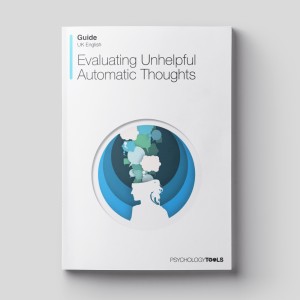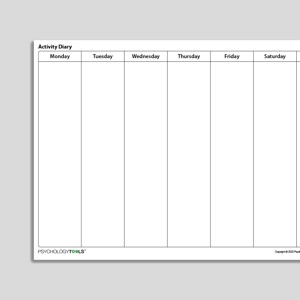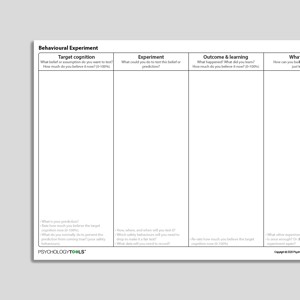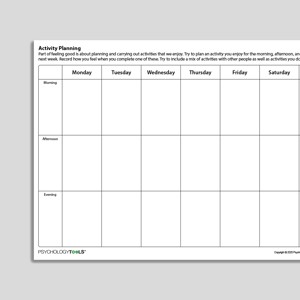Bipolar disorder
Individuals with bipolar disorder experience significant fluctuations in their mood including manic or hypomanic episodes (‘highs’) and depressive episodes (‘lows’). The term ‘bipolar’ refers to the way that mood can change between the two extremes. Different types of bipolar disorder are diagnosed depending upon which combination of mood states are experienced. Psychological approaches have been demonstrated to complement purely medical management of bipolar disorder (lam et al, 1999; Otto et al, 2009).
Managing Bipolar Disorder: Therapist Guide
Managing Bipolar Disorder: Therapist Guide
Insufficient Self-Control
Insufficient Self-Control
Dependence / Incompetence
Dependence / Incompetence
Approval-/Admiration-Seeking
Approval-/Admiration-Seeking
Unified Protocol for Transdiagnostic Treatment of Emotional Disorders (Second Edition): Client Workbook
Unified Protocol for Transdiagnostic Treatment of Emotional Disorders (Second Edition): Client Workbook
Unified Protocol for Transdiagnostic Treatment of Emotional Disorders (Second Edition): Therapist Guide
Unified Protocol for Transdiagnostic Treatment of Emotional Disorders (Second Edition): Therapist Guide
Magnification And Minimization
Magnification And Minimization
Evaluating Unhelpful Automatic Thoughts
Activity Diary (Hourly Time Intervals)
Activity Diary (Hourly Time Intervals)
Activity Diary (No Time Intervals)
Activity Diary (No Time Intervals)
Unhelpful Thinking Styles (Archived)
Unhelpful Thinking Styles (Archived)
Behavioral Experiment (Portrait Format)
Behavioral Experiment (Portrait Format)
Links to external resources
Psychology Tools makes every effort to check external links and review their content. However, we are not responsible for the quality or content of external links and cannot guarantee that these links will work all of the time.
Assessment
-
Assessment Tools For Adult Bipolar Disorder
| Miller, Johnson, Eisner | 2009
- Journal article
-
Mood Disorder Questionnaire (MDQ)
| Hirschfield, Williams, Spitzer, Calabrese, Flynn, Keck, Lewis, McElroy, Post, Rapport, Russel, Sachs, Zajecka | 2000
- Scale
- Reference Hirschfeld, R. M., Williams, J. B., Spitzer, R. L., Calabrese, J. R., Flynn, L., Keck Jr, P. E., … & Russell, J. M. (2000). Development and validation of a screening instrument for bipolar spectrum disorder: the Mood Disorder Questionnaire.American Journal of Psychiatry,157(11), 1873-1875.
-
Bipolar Recovery Questionnaire
| Jones, Mulligan, Higginson, Dunn, Morrison | 2013
- Scale
- Reference Jones, S., Mulligan, L. D., Higginson, S., Dunn, G., & Morrison, A. P. (2013). The bipolar recovery questionnaire: psychometric properties of a quantitative measure of recovery experiences in bipolar disorder.Journal of affective disorders,147(1-3), 34-43.
Information Handouts
-
Bipolar (Information Handouts)
| Centre For Clinical Interventions
- What is bipolar disorder?
- What causes bipolar disorder?
- Medications for bipolar disorder
- Psychosocial treatments for bipolar disorder
- Detecting early warning signs
- Mood and symptom monitoring
- Vicious cycle of depression
- Behavioral activation: fun and achievement
- Fun activities catalogue
- Improving how you feel
- Thinking and feeling
- Analysing your thinking
- Changing your thinking
- Unhelpful thinking styles
- Cognitive changes in mania
- Preventing manic thinking
- Preventing mania
- Organising and prioritising ideas and projects
- Coping with stressful events
- Problem solving
- Staying healthy
-
Bipolar Disorder (Information Handouts)
| Center For Clinical Interventions
- What Is Bipolar Disorder?
- What Causes Bipolar Disorder?
- Medications For Bipolar Disorder
- Psychotherapy For Bipolar Disorder
- Detecting Early Warning Signs
- Mood and Symptom Monitoring
- Vicious Cycle of Depression
- Behavioural Activation: Fun and Achievement
- Fun Activities Catalogue
- Improving How You Feel
- Thinking and Feeling
- Analysing Your Thinking
- Changing Your Thinking
- Unhelpful Thinking Styles (Overview)
- Cognitive Changes in Mania
- Preventing Manic Thinking
- Preventing Mania
- Organising and Prioritising Ideas and Projects
- Coping with Stressful Events
- Problem Solving
- Staying Healthy
- Dealing with anger and impulsivity | Black Dog Institute
Presentations
- Recovery focused CBT for bipolar disorder | Steven Jones youtube
- Diagnostic challenges: bipolar disorders and other mood disorders | Wang | 2008
- Cognitive behavioral therapy for bipolar disorder | Culver | 2009
- Cognitive behavioural treatment of bipolar disorder | Michael Otto
Self-Help Programmes
-
Keeping Your Balance (Workbook)
| Centre For Clinical Interventions | 2003
- Module 1: Overview of Bipolar Disorder
- Module 2: Treatment Options
- Module 3: Self Monitoring for Relapse Prevention
- Module 4: Behavioural Strategies for Managing and Preventing Depression
- Module 5: Cognitive Strategies for Managing and Preventing Depression
- Module 6: Cognitive Strategies for Preventing Mania
- Module 7: Behavioural Strategies for Preventing Mania
- Module 8: Coping with Psychosocial Stressors and Self Management
Treatment Guide
- Understanding bipolar disorder: why some people experience extreme mood states and what can help | British Psychological Society (BPS) Division of Clinical Psychology (DCP) | 2010
- Bipolar disorder: assessment and management: clinical guideline | National Institute for Health and Care Excellence (NICE) | 2014
Worksheets
-
Bipolar (Worksheets)
| Centre For Clinical Interventions
- Bipolar symptoms
- Medication record
- Stress vulnerability
- Early warning signs
- Plan of action
- Mood monitoring
- Symptom monitoring
- Behavioral activation
- Weekly activity schedule
- Weekly goals record
- Making the connection (between thoughts and emotions)
- Thought diary 1
- Thought diary 2
- Thought diary 3
- Thought diary (simplified)
- Balance sheet
- Organising ideas list
- Coping resources
- Problem solving
- Self management plan
- Goal setting (end of therapy)
-
Bipolar Disorder (Worksheets)
| Centre For Clinical Interventions
- Bipolar Symptoms
- Medication Record
- Stress Vulnerability
- Early Warning Signs
- Plan of Action
- Mood Monitoring
- Symptom Monitoring
- Behavioural Activation
- Weekly Activity Schedule
- Weekly Goals Record
- Making the Connection (Between Thoughts and Emotions)
- Thought Diary 1
- Thought Diary 2
- Thought Diary 3
- Thought Diary (Simplified)
- Balance Sheet
- Organising Ideas List
- Coping Resources
- Problem Solving
- Self Management Plan
- Goal Setting
- My well-being plan for bipolar disorder | Black Dog Institute
Recommended Reading
- Mansell, W. (2007). An integrative formulation‐based cognitive treatment of bipolar disorders: Application and illustration.Journal of clinical psychology,63(5), 447-461.
- Juruena, M. F. P. (2012). Cognitive-behavioral therapy for the bipolar disorder patients. InStandard and Innovative Strategies in Cognitive Behavior Therapy. InTech.
What Is Bipolar Disorder?
Signs and Symptoms of Bipolar Disorder
Diagnoses of bipolar and related disorders are made based on the presence of episodes of hypomania, mania, or depression. Summary diagnostic criteria are given below.To meet criteria for Bipolar I disorder an individual must have experienced at least one lifetime manic episode.
To meet criteria for Bipolar II disorder an individual must have experienced at least one hypomanic episode and one depressive episode; and must never have experienced a manic episode.
To meet criteria for cyclothymic disorder the individual must have experienced numerous sub-threshold episodes of hypomanic and depressive symptoms that do not meet full criteria for a hypomanic, manic, or depressive episode; have never met full criteria for a manic, hypomanic, or depressive episode; and experience cyclothymic periods most of the time.
a period of elevated, expansive, or irritable mood that is abnormal for the individual
increased goal-directed activity or energy
increased self-esteem or grandiosity
decreased need for sleep
increased talkativeness, or pressure to keep talking
flight of ideas or the subjective experience that thoughts are racing
difficulty concentrating or distractibility
excessive reckless behavior
increased activity or physical restlessness
loss of social inhibitions resulting in inappropriate behavior
marked sexual energy/indiscretions
a period of elevated, expansive, or irritable mood that is abnormal for the individual
persistently increased activity or energy
increased talkativeness or pressure to keep talking
difficulty concentrating or distractibility
decreased need for sleep
excessive reckless behavior
increase in activity or psychomotor agitation
inflated self-esteem or grandiosity
flight of ideas or the subjective experience that thoughts are racing
increased sociability or over-familiarity
increased sexual energy
depressed mood most of the day, nearly every day
diminished interest in previously pleasurable activities
fatigue or loss of energy
sleep disturbance
feelings of worthlessness, self-reproach, or excessive guilt
diminished ability to think or concentrate
recurrent thoughts of death or suicide, or suicidal behavior
changes in appetite, with corresponding weight change
psychomotor agitation or retardation
loss of confidence and self-esteem
Evidence-Based Psychological Approaches for Working with Bipolar Disorder
Bipolar disorder is best seen as a multifaceted condition with broad biological, social, and psychological components. Medical management is crucially important, but psychological interventions can also play a helpful role: particularly in the long-term management and prevention of relapse, building resilience, and improving quality of life. A 2014 review concluded that “The evidence demonstrates that bipolar disorder-specific psychotherapies, when added to medication for the treatment of bipolar disorder, consistently show advantages over medication alone on measures of symptom burden and risk of relapse … those who receive bipolar disorder-specific psychotherapy fare better than those who do not”(Swartz & Swanson, 2014). Interventions that have been researched include:psychoeducation
cognitive behavioral therapy for bipolar disorder
interpersonal and social rhythm therapy (IPSRT)
family-focused therapy
mindfulness-based interventions
Resources for Working with Bipolar Disorder
Psychology Tools resources available for working therapeutically with bipolar disorder may include:psychological models of bipolar disorder
information handouts for bipolar disorder
exercises for bipolar disorder
CBT worksheets for bipolar disorder
self-help programs for bipolar disorder
References
Lam, D. H., Jones, S. H., Hayward, P., & Bright, J. A. (1999). Cognitive therapy for bipolar disorder: A therapist’s guide to concepts, methods, and practice. Malden, MA: Wiley.
Otto, M. W., Reilly-Harrington, N. A., Kogan, J. N., Henin, A., Knauz, R. O., & Sachs, G. S. (2009). Managing bipolar disorder: A cognitive-behavioral approach—therapist guide. New York: Oxford University Press.
Swartz, H. A., & Swanson, J. (2014). Psychotherapy for bipolar disorder in adults: A review of the evidence. Focus, 12(3), 251–266.
































